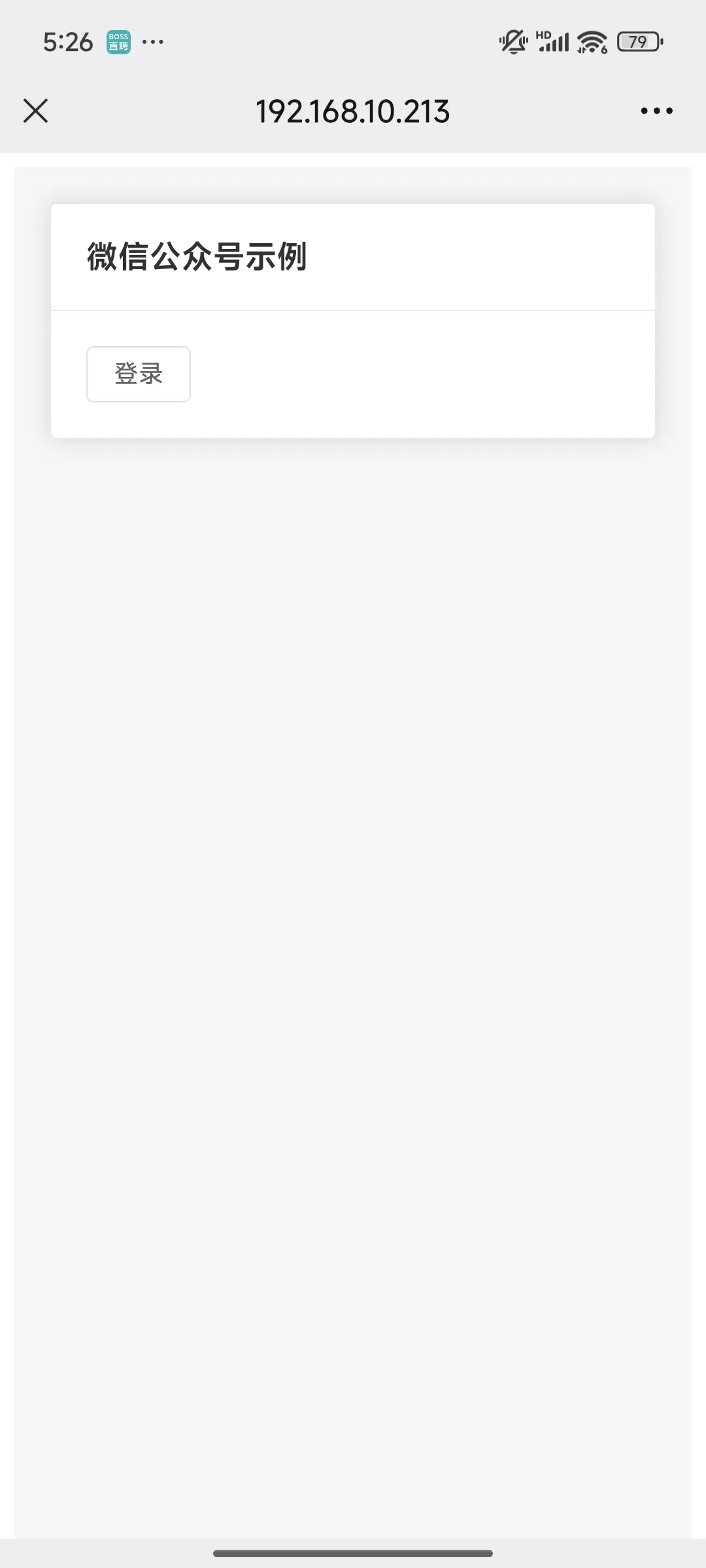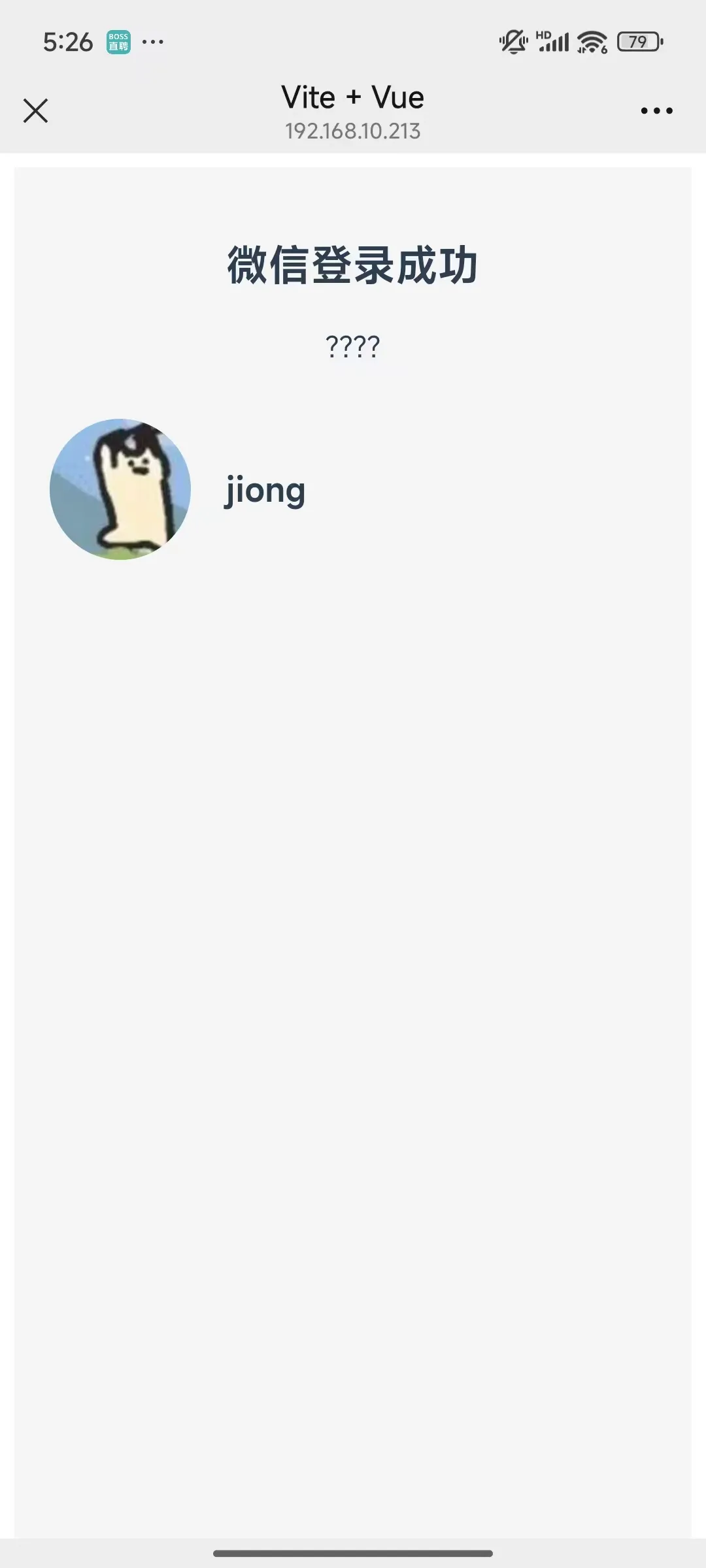创建VUE3项目
创建初始文件
进入项目存放位置
右键用命令行打开(终端打开)
npm create vite@latest wechat-report --template vuenpm:包管理需要安装node.js
Vite:用于热部署和生成、打包项目
--template vue:模板指定为vue
可能报错: 因为在此系统上禁止运行脚本。有关详细信息
会提示是否继续:
Ok to proceed? (y)
输入y回车
会让选择版本和类型:
如:◆ Select a framework:
│ ○ Vanilla
│ ● Vue
│ ○ React
用方向键移动到VUE,回车
用方向键移动到JavaScript ,回车
移动到创建好的项目中初始化
cd wechat-report
npm install安装Element Plus
# 安装Element Plus
npm install element-plus @element-plus/icons-vue
# 安装自动导入插件(可选但推荐)
npm install -D unplugin-vue-components unplugin-auto-import第一行安装elementPlus 和图标库
第二行是自动导入插件:自动按需导入 Vue 组件(如 Element Plus 的 <el-button>),无需手动 import
- unplugin-auto-import:自动导入 Vue 相关的 API(如 ref、reactive、onMounted 等),减少手动导入的代码。
- 减少代码量 :不用手动写 import { ElButton } from 'element-plus'。
- 优化打包体积 :只打包实际用到的组件,避免全量引入。
配置项目
进入项目,找到
修改vite.config.js:
设置elementui,@/路径功能,后台地址映射
import { defineConfig } from 'vite'
import vue from '@vitejs/plugin-vue'
import { fileURLToPath, URL } from 'node:url'
import AutoImport from 'unplugin-auto-import/vite'
import Components from 'unplugin-vue-components/vite'
import { ElementPlusResolver } from 'unplugin-vue-components/resolvers'
// https://vitejs.dev/config/
export default defineConfig({
plugins: [
vue(),
AutoImport({
resolvers: [ElementPlusResolver()],
}),
Components({
resolvers: [ElementPlusResolver()],
}),
],
resolve: {
alias: {
'@': fileURLToPath(new URL('./src', import.meta.url)) // 使用现代ESM方式
}
},
server: {
proxy: {
'/api': {
target: 'http://your-backend-api.com', // 替换为实际后端地址
changeOrigin: true,
rewrite: path => path.replace(/^\/api/, '')
}
}
}
})安装微信JSSDK
npm install weixin-js-sdk创建API服务
在src/api目录下创建wechat.js:
import axios from 'axios'
const service = axios.create({
baseURL: '/api', // 根据实际后端API地址配置
timeout: 5000
})
// 获取校验url,用于登录
export function getAuthorizationUrl(url) {
return service({
method: 'post',
url: '/api/emergency/wxLoginReport/getAuthorizationUrl',
data: { url }
})
}
// 其他API...修改App.vue
清空内容
<template>
<router-view />
</template>
<script>
export default {
name: 'App',
setup() {
return {}
}
}
</script>
<style>
/* 全局样式 */
#app {
font-family: Avenir, Helvetica, Arial, sans-serif;
-webkit-font-smoothing: antialiased;
-moz-osx-font-smoothing: grayscale;
color: #2c3e50;
max-width: 100vw;
min-height: 100vh;
background-color: #f5f5f5;
}
</style>配置路由
安装Vue Router:
npm install vue-router@4创建src/router/index.js:
创建登录页面和结果页面
import { createRouter, createWebHashHistory } from 'vue-router'
const routes = [
//登录页面
{
path: '/',
name: 'Home',
component: () => import('@/views/Home.vue')
},
//登录结果
{
path: '/Home2',
name: 'Home2',
component: () => import('@/views/Home2.vue')
},
// 其他路由...
]
const router = createRouter({
history: createWebHashHistory(), // 使用hash模式,兼容微信公众号
routes
})
export default router创建示例页面
创建src/views/Home.vue:
用于测试微信功能登录
<template>
<div class="home">
<el-card class="box-card">
<template #header>
<div class="card-header">
<span>微信公众号示例</span>
</div>
</template>
<el-button @click="loginAuth">登录</el-button>
</el-card>
</div>
</template>
<script>
import {getAuthorizationUrl} from '@/api/wechat'
export default {
name: 'Home',
setup() {
const loginAuth = () => {
// let url = window.location.href;
let url = 'http://192.168.10.213:5173/#/Home2';
// console.log(url)
getAuthorizationUrl(url).then(res => {
console.log(res.data.msg)
window.location.href = res.data.msg;
})
};
return {
loginAuth
}
}
}
</script>
<style scoped>
.home {
padding: 20px;
}
.box-card {
max-width: 500px;
margin: 0 auto;
}
.card-header {
font-size: 18px;
font-weight: bold;
}
</style>创建src/views/Home2.vue:
登录结果页面
<template>
<div class="wechat-auth-result">
<!-- 加载状态 -->
<div v-if="loading" class="loading">加载中...</div>
<!-- 成功状态 -->
<div v-if="userInfo && !error" class="success">
<div class="header">
<h2>微信登录成功</h2>
<p>{{ userInfo.message }}</p>
</div>
<div class="profile">
<img :src="userInfo.headimgurl" alt="用户头像" class="avatar">
<div class="details">
<h3>{{ userInfo.nickname }}</h3>
<!-- <button @click="goToDashboard" class="btn btn-primary">进入首页</button>-->
</div>
</div>
</div>
<!-- 错误状态 -->
<div v-if="error" class="error">
<h2>登录失败</h2>
<p>{{ error }}</p>
<button @click="retryLogin" class="btn btn-secondary">重新登录</button>
</div>
</div>
</template>
<script>
import {ref, onMounted} from 'vue';
import {useRoute, useRouter} from 'vue-router';
export default {
setup() {
const route = useRoute();
const router = useRouter();
const userInfo = ref(null);
const loading = ref(true);
const error = ref(null);
// 获取并处理URL参数
const parseUserInfo = () => {
try {
if (route.query.openid) {
userInfo.value = {
openid: route.query.openid,
nickname: decodeURIComponent(route.query.nickname || '未知用户'),
headimgurl: decodeURIComponent(route.query.headimgurl || ''),
message: decodeURIComponent(route.query.msg || '登录成功')
};
// 清理URL
window.history.replaceState({}, '', window.location.pathname);
// 这里可以添加将用户信息存储到Vuex/Pinia或发送到后端验证的逻辑
} else {
error.value = '未获取到用户信息';
}
} catch (e) {
error.value = '解析用户信息失败: ' + e.message;
} finally {
loading.value = false;
}
};
// const goToDashboard = () => {
// router.push('/dashboard');
// };
const retryLogin = () => {
router.push('/');
};
onMounted(() => {
parseUserInfo();
});
return {userInfo, loading, error, retryLogin};
}
};
</script>
<style scoped>
.wechat-auth-result {
max-width: 500px;
margin: 0 auto;
padding: 20px;
}
.loading {
text-align: center;
padding: 40px 0;
}
.success .header {
text-align: center;
margin-bottom: 30px;
}
.profile {
display: flex;
align-items: center;
gap: 20px;
margin-top: 20px;
}
.avatar {
width: 80px;
height: 80px;
border-radius: 50%;
object-fit: cover;
}
.details {
flex: 1;
}
.error {
color: #dc3545;
text-align: center;
padding: 40px 0;
}
.btn {
margin-top: 15px;
padding: 8px 16px;
border-radius: 4px;
cursor: pointer;
}
.btn-primary {
background-color: #007bff;
color: white;
border: none;
}
.btn-secondary {
background-color: #6c757d;
color: white;
border: none;
}
</style>修改main.js
import { createApp } from 'vue'
import App from './App.vue'
import router from './router'
// 引入Element Plus样式
import 'element-plus/dist/index.css'
const app = createApp(App)
app.use(router)
app.mount('#app')package.json
加上--host,用与显示内容
"scripts": {
"dev": "vite --host"
}npm run dev 启动
springboot后台
controller层
用于拼接微信调用地址与处理回调信息
package yunline.controller;
import yunline.entity.TdSspUserEntity;
import io.swagger.annotations.Api;
import io.swagger.annotations.ApiOperation;
import org.springframework.beans.factory.annotation.Autowired;
import org.springframework.web.bind.annotation.*;
import yunline.base.ActionResult;
import yunline.service.TdSspUserService;
import yunline.utils.WxReportUtils;
import javax.servlet.http.HttpServletRequest;
import javax.servlet.http.HttpServletResponse;
import java.net.URLDecoder;
import java.net.URLEncoder;
import java.nio.charset.StandardCharsets;
import java.util.*;
@Api(tags = "应急排班系统", value = "emergency")
@RestController
@RequestMapping("/api/emergency/wxLoginReport")
public class WxReportController {
@Autowired
private TdSspUserService tdSspUserService;
@ApiOperation("获取微信授权地址")
@PostMapping("/getAuthorizationUrl")
public ActionResult getAuthorizationUrl(@RequestBody Map<String, String> params) throws Exception {
System.out.println("进入");
String url = params.get("url");
url = URLEncoder.encode(url, StandardCharsets.UTF_8.toString());
return ActionResult.success(WxReportUtils.getAuthorizationUrl(url));
}
/**
* 当用户授权后,微信会重定向到你指定的URI,并携带一个code参数。你需要捕获这个请求并提取code。
*/
@ApiOperation("捕获微信授权回执")
@GetMapping("/handleAuthorizationCallback")
public void handleAuthorizationCallback(HttpServletRequest request, HttpServletResponse response) throws Exception {
String code = request.getParameter("code");
String state = request.getParameter("state");
Map<String, String[]> c = request.getParameterMap();
if (code == null) {
// 处理错误情况
// response.getWriter().println("授权失败,请重试!");
// return ActionResult.fail("授权失败,请重试!");
String frontendUrl = URLDecoder.decode(state, "UTF-8")
+"?openid="
+"&msg=授权失败!";
response.sendRedirect(frontendUrl);
return ;
}
// 获取access_token和openid
Map<String, String> tokenInfo = WxReportUtils.getTokenInfo(code);
if (tokenInfo == null || !tokenInfo.containsKey("access_token") || !tokenInfo.containsKey("openid")) {
// response.getWriter().println("获取access_token失败,请重试!");
// return ActionResult.fail("获取access_token失败,请重试!");
String frontendUrl = URLDecoder.decode(state, "UTF-8")
+"?openid="
+"&msg=获取access_token失败!";
response.sendRedirect(frontendUrl);
return ;
}
String accessToken = tokenInfo.get("access_token");
String openid = tokenInfo.get("openid");
// 获取用户信息
Map<String, Object> userInfo = WxReportUtils.getUserInfo(accessToken, openid);
if (userInfo == null || !userInfo.containsKey("nickname") || !userInfo.containsKey("headimgurl")) {
// response.getWriter().println("获取用户信息失败,请重试!");
// return ActionResult.fail("获取用户信息失败,请重试!");
String frontendUrl = URLDecoder.decode(state, "UTF-8")
+"?openid="
+"&msg=获取用户信息失败!";
response.sendRedirect(frontendUrl);
return ;
}
// 完成本地用户认证
String nickname = (String) userInfo.get("nickname");
String headimgurl = (String) userInfo.get("headimgurl");
// String sex = (String) userInfo.get("sex");
Map<String, Object> map = new HashMap<>();
int has = tdSspUserService.lambdaQuery().eq(TdSspUserEntity::getRemark, openid).count();
if (has > 0) {
//修改
tdSspUserService.lambdaUpdate().eq(TdSspUserEntity::getRemark, openid)
.set(TdSspUserEntity::getPhotopath,headimgurl)
.set(TdSspUserEntity::getUserId,nickname).update();
}else{
//创建
TdSspUserEntity entity = new TdSspUserEntity();
entity.setUserId(nickname);
entity.setPhotopath(headimgurl);
entity.setRemark(openid);
entity.setNickName(nickname);
entity.setUserRegdate(new Date());
tdSspUserService.create(entity);
}
map.put("userInfo", userInfo);
map.put("openid", openid);
// return ActionResult.success(map);
//重定向
String frontendUrl = URLDecoder.decode(state, "UTF-8")
+"?openid=" + openid
+"&msg=登录成功"
+"&nickname="+nickname
+"&headimgurl="+headimgurl
;
response.sendRedirect(frontendUrl);
// return null;
}
}创建WxReportUtils,用于对接微信
package yunline.utils;
import cn.hutool.json.JSONUtil;
import java.io.BufferedReader;
import java.io.InputStreamReader;
import java.net.*;
import java.nio.charset.StandardCharsets;
import java.util.Map;
public class WxReportUtils {
private static final String IP = getIP();
private static final String APPID = "你的appid";
private static final String APPSECRET = "你的APPSECRET";
// private static final String SCOPE = "snsapi_base";
// private static final String SCOPE = "snsapi_login";
private static final String SCOPE = "snsapi_userinfo";
private static final String PORT = "28888";
private static final String STATE = "STATE";
private static final String REDIRECT_URI = "后台调用地址,就是controller层的callback";
private static String getIP() {
try {
InetAddress localhost = InetAddress.getLocalHost();
// IP=localhost.getHostAddress();
return localhost.getHostAddress();
} catch (UnknownHostException e) {
e.printStackTrace();
}
return "";
}
public static String getAuthorizationUrl() throws Exception {
return getAuthorizationUrl(STATE);
}
public static String getAuthorizationUrl(String url) throws Exception {
return "https://open.weixin.qq.com/connect/oauth2/authorize?"
+ "appid=" + APPID
+ "&redirect_uri=" + URLEncoder.encode(REDIRECT_URI, StandardCharsets.UTF_8.toString())
+ "&response_type=code"
+ "&scope=" + SCOPE
// + "&state=" + STATE
+ "&state=" + url
+ "#wechat_redirect";
}
/**
* 获取token和openid
*
* @param code
* @return
* @throws Exception
*/
public static Map<String, String> getTokenInfo(String code) throws Exception {
String url = "https://api.weixin.qq.com/sns/oauth2/access_token?"
+ "appid=" + APPID
+ "&secret=" + APPSECRET
+ "&code=" + code
+ "&grant_type=authorization_code";
HttpURLConnection connection = (HttpURLConnection) new URL(url).openConnection();
connection.setRequestMethod("GET");
int responseCode = connection.getResponseCode();
if (responseCode == 200) {
BufferedReader in = new BufferedReader(new InputStreamReader(connection.getInputStream()));
String inputLine;
StringBuilder content = new StringBuilder();
while ((inputLine = in.readLine()) != null) {
content.append(inputLine);
}
in.close();
connection.disconnect();
return JSONUtil.toBean(content.toString(), Map.class, false);
} else {
throw new RuntimeException("请求失败:" + responseCode);
}
}
/**
* 获取用户信息
*
* @param accessToken
* @param openId
* @return
* @throws Exception
*/
public static Map<String, Object> getUserInfo(String accessToken, String openId) throws Exception {
String url = "https://api.weixin.qq.com/sns/userinfo?"
+ "access_token=" + accessToken
+ "&openid=" + openId
+ "&lang=zh_CN";
HttpURLConnection connection = (HttpURLConnection) new URL(url).openConnection();
connection.setRequestMethod("GET");
int responseCode = connection.getResponseCode();
if (responseCode == 200) {
BufferedReader in = new BufferedReader(new InputStreamReader(connection.getInputStream()));
String inputLine;
StringBuilder content = new StringBuilder();
while ((inputLine = in.readLine()) != null) {
content.append(inputLine);
}
in.close();
connection.disconnect();
return JSONUtil.toBean(content.toString(), Map.class, false);
} else {
throw new RuntimeException("请求失败:" + responseCode);
}
}
}微信配置
进入微信测试地址:
https://mp.weixin.qq.com/debug/cgi-bin/sandboxinfo
注册后进行配置
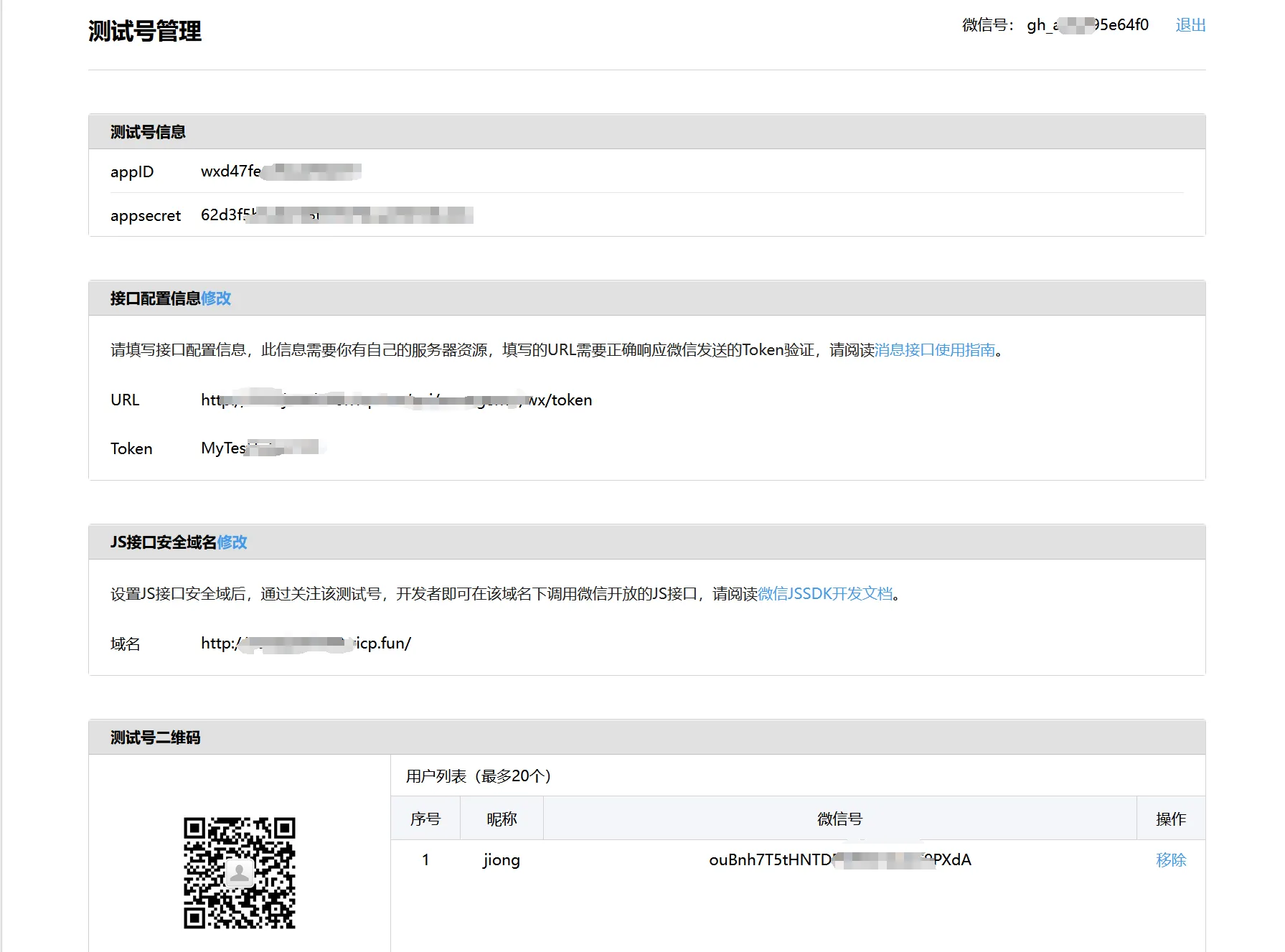
配置获取用户信息的权限,配置一下域名
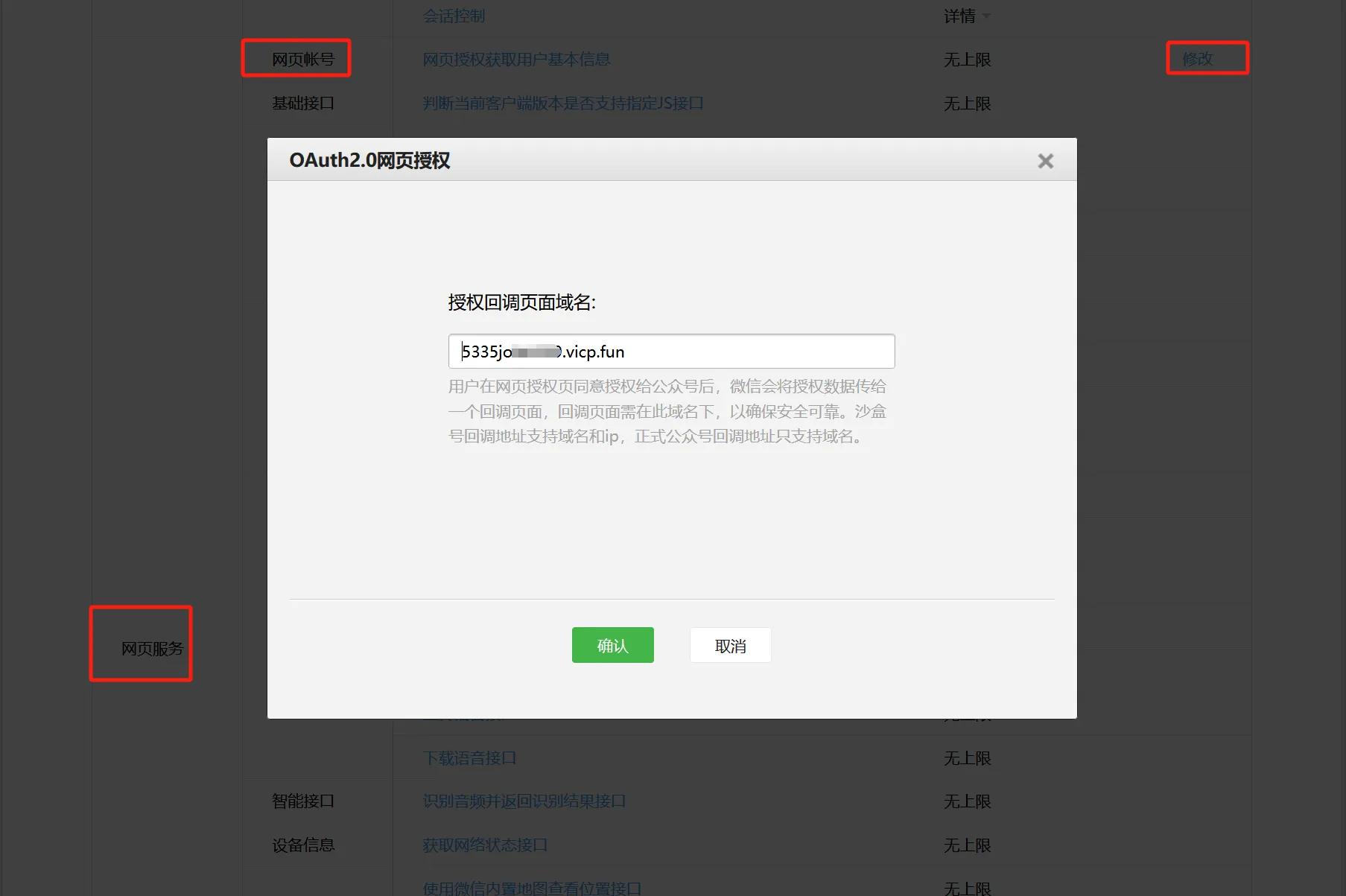
内网穿透(可选
这里我使用的是花生壳网穿透获得的外网地址,用了10块钱巨款
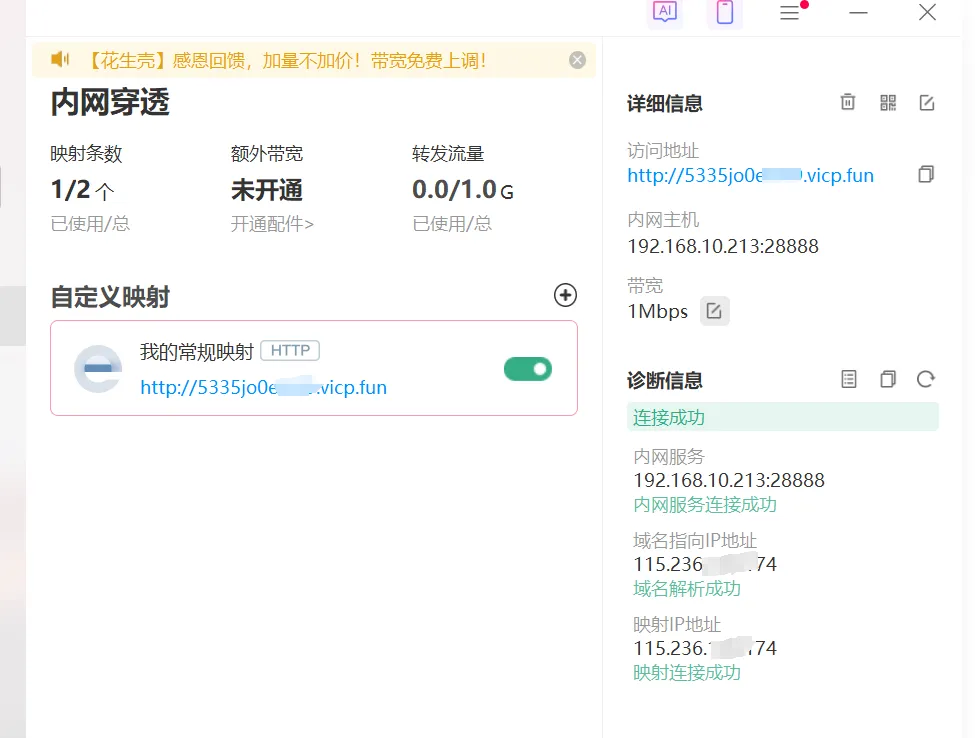
结果演示
